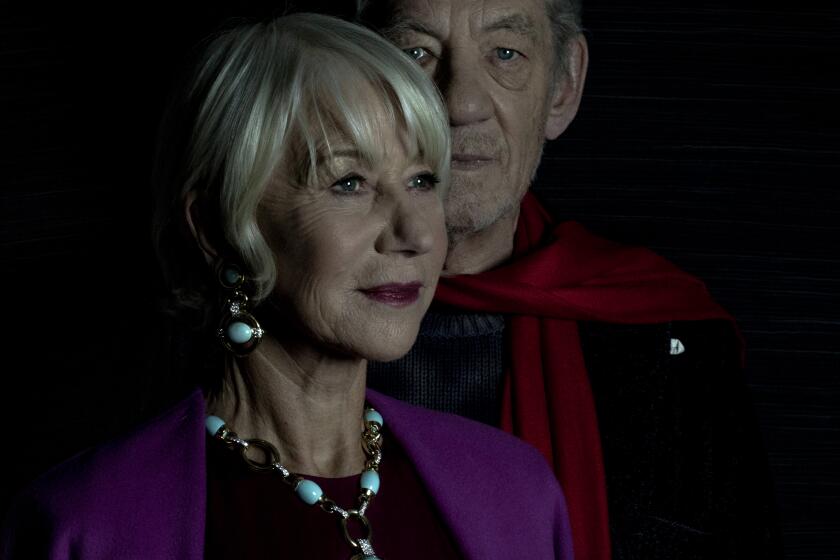‘Good Liar’ ending explained: How the stars flip the script on gender roles
Spoiler warning: The following story includes details of the plot twists and resolution of “The Good Liar.” If you haven’t seen the film and want to preserve the surprises, we suggest you wait to read.
All is not as it seems in Bill Condon’s thriller “The Good Liar.” The film’s ultimate twist, which sees a shift of power between the two main characters, has a more timely relevance than the filmmaker initially thought when he adapted Nicholas Searle’s novel of the same name.
At the end of the movie, after it appears that Helen Mirren’s Betty has been duped into giving away her fortune to Roy, a con man played by Ian McKellen, she reveals her own master plan in a lengthy monologue and flashback scene. The presumed female victim, as it turns out, has been conning the con man.
After realizing that Betty may have played him, Roy returns to her suburban home, which he finds dark and completely emptied of furniture. Betty is sitting in the shadows, waiting, and to Roy’s surprise she recounts a story of growing up in Berlin, where he was her English teacher. As a young girl, Roy raped her and then destroyed her family, leaving her and her sisters to suffer through the end of World War II with almost nothing.
Betty has been waiting all these decades for revenge, for a final moment of comeuppance.
“There are a lot of ways in which I’ve described ‘The Good Liar’ in the last four or five years since reading the novel, but timely wasn’t one of them,” Condon says. “And it’s interesting because this is all in the novel and the novel existed well before these events took place in real life. It’s almost as if it’s an answer to the question that people always throw at Bill Cosby accusers: What took you so long? That thing that people think of as an easy defense.
“And the fact is when something like that happens you watch a character like Betty shut down for 50 years and only late in life has come to a point, after widowhood, where she realizes she has to take care of this one thing. I’m surprised that it’s timely, because we didn’t do anything to make it relevant. But it speaks to the fact that it’s always been there.”
Helen Mirren and Ian McKellen have worked together before, but Bill Condon’s thriller “The Good Liar” marks their first time co-starring in a movie.
The scene, shot on a soundstage, was done toward the end of production and Mirren had only a few takes to get Betty’s speech right with little rehearsal or preparation. Condon ended up using her first attempt.
“When you have a really big denouement, as that scene is, you do feel the pressure as an actor of ‘I hope I get this right. I hope I don’t blow it. I hope I don’t overdo it or underdo it,’” Mirren says, speaking alongside McKellen at the Corinthia Hotel in London. “You are very aware of the import of a scene like that. You don’t want to let the audience down at a moment like that. You want them to get their money’s worth.”
Originally, Condon included more clues about Betty’s deception leading up to that revelation. But the director, who peppered references to World War II throughout the story to hint at what was to come and included small hints throughout Betty’s house, wanted the audience to find their way to the truth as Roy does.
“Because it’s teased to people as being a twisty-turny thriller I’ve found that some people, 10 minutes in, say, ‘I’ve figured it out. I knew Helen wasn’t that gullible,’” Condon says with a laugh. “And of course that was our intention. When you cast Helen Mirren — that bit of casting is the first clue that she’s not going to just fall for this thing. It’s not that she is up to something, it’s ‘What is she up to?’”
For Mirren, the shift of power from the male perpetrator to the female accuser hit home. It’s a cathartic moment for the character but also for the actress and her viewers. Feeling powerless is something Mirren says she knows well, and she was able to tap into that sense of wanting to right a wrong when playing out the scene.
“I didn’t necessarily relate it to the Me Too movement, but a lot of young women have had physical experiences that they didn’t want, that they didn’t enjoy,” Mirren says. “It doesn’t necessarily go as far as it goes in this particular story, but there are many, many different levels of that sort of thing. Moments when they felt like they were being used like a piece of tissue paper. On that level, I did identify with it.”
She adds, “I remember I went to a film interview with [film director] Michael Winner. He didn’t physically touch me, but he made me stand up and turn around. I was so mortified and insulted, because I thought I was a serious actress, which I was actually, and it was so demeaning. Moments like that — it’s not necessarily being shoved up against a corner and being kissed — that was the one that really got me. I’d like to have my moment with him.”
Review: ‘The Good Liar’ makes the most of Ian McKellen and Helen Mirren, even when the story falters
Stars Helen Mirren and Ian McKellen shine in pursuit of mendacity
McKellen had a similar encounter with Winner, who denied the incident with Mirren after she included it in her 2008 book “In the Frame.”
“I did an interview with him and I’d been acting for about four years,” McKellen says. “[Winner] said, ‘You queer, boy?’ I’d never been asked that before and I wasn’t quite sure what it meant. I probably said no. He said, ‘It’s all right if you are, I think your career’s made.’ I didn’t get the part. Forty years later I saw him in a restaurant and he came over and said, ‘I’m sorry about asking you that question.’ Forty years later. It had been bothering him more than it had been bothering me.”
Mirren responds, “I don’t think the thing with me bothered him at all. Not remotely. And when I put that in my book he denied it. He said, ‘I never did that.’ He absolutely did. I wouldn’t remember it otherwise. He didn’t think it was remotely wrong.”
Both actors compare the shift of power at the end of “The Good Liar” to the way many productions of Shakespeare toy with classic stories by gender-swapping the characters. Seeing a recent version of “The Taming of the Shrew” at the Royal Shakespeare Company gave McKellen a newfound appreciation for how women are demeaned by men. “That must be what it’s like to be a woman on many occasions,” he says, reflecting on a particular scene. “Shame it took that production to show it to me.”
But like with Shakespeare, “The Good Liar” simply turns a well-trodden assumption about gender on its head. “There’s a worry that people might think we were exploiting something — that somehow we’d made the whole movie on the heels of that stuff happening and we were using it as a plot point in entertainment,” Condon notes of the film’s relevance. “But I always felt that because it existed already in the book it was clear that it had always been there.”
More to Read
Only good movies
Get the Indie Focus newsletter, Mark Olsen's weekly guide to the world of cinema.
You may occasionally receive promotional content from the Los Angeles Times.







